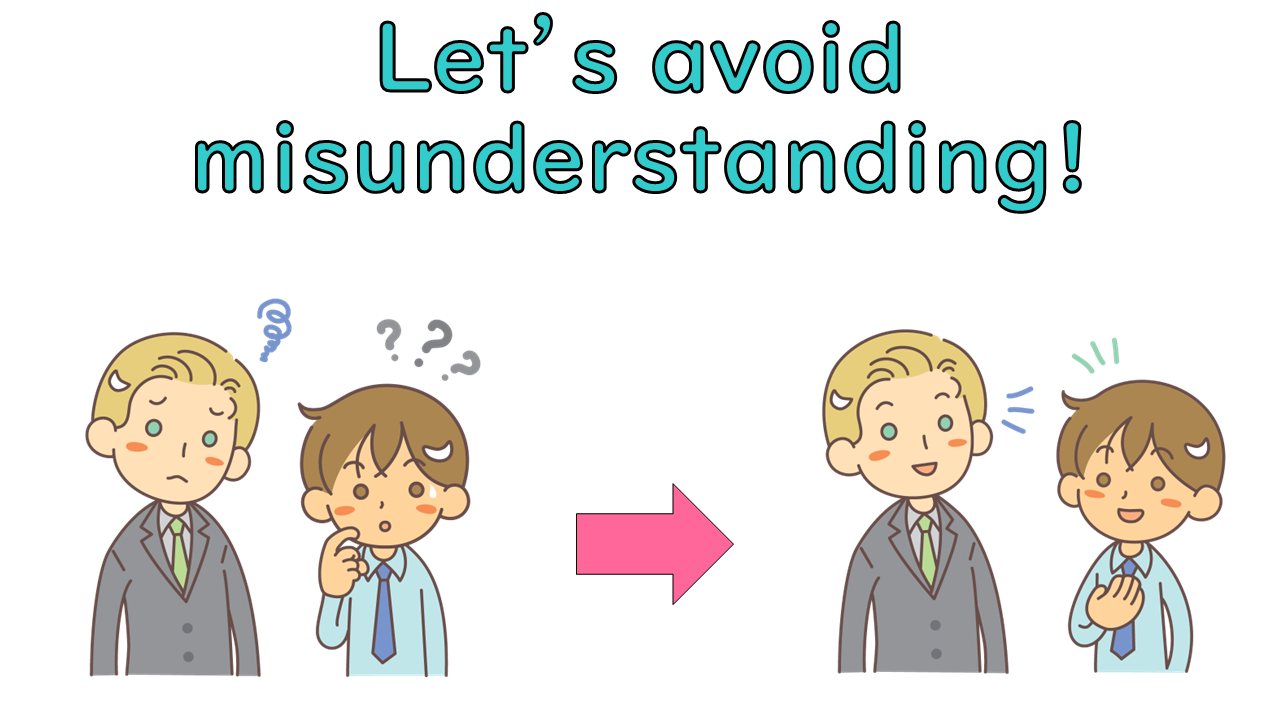Misunderstanding with Japanese people? Top 2 cases -Let’s figure out!
Oct 23, 2022
Hi. Do you want to avoid misunderstanding with Japanese people? Based on the 3 crucial cultural points from the last article, I’ll introduce the top 2 cases. At the end of the article, you can check your current knowledge on the ‘Can Do List’.
前回の記事で日本人に好印象を与えるポイントを3つ紹介しました。今回はよくある誤解のケースを2つ紹介します。最後にチェックリストで自分がなにができているかチェックしてみてください。
You might feel ‘I could have avoided it if I knew these Japanese ways of thinking…’ So, I hope reading the cases will be helpful for you. Have you encountered one of the cases below?
日本人の考え方を「知っていたら避けられた、、」ということばかりですので、損をしないように読んでみてください。このような経験はありませんか。
<Case 1 ケース1>
I received the business card and I asked how to read the kanji of her name. As she said ‘Aoki desu.’I responded ‘Aoki desune.’by repeating what she said.
名刺をもらった時、相手の名前の漢字の読み方が分からなかったので確認したら、「はい。私は青木です。」と返答があった。私は聞いた通りに「あ〜、青木ですね。分かりました」と言った。
Q:What is the problem here? 何が問題だと思いますか。
A: It is normal to call ‘Name+san’ in Japanese. This is well-known. However, you might forget to say ‘Aoki san’ just because your focus was on the kanji reading.
日本では相手の名前に「〜さん」をつけて呼ぶのが一般的で、みなさんも充分分かっていると思います。でも、このケースでは漢字の読み方に集中してしまい、つい「〜さん」をつけるのを忘れてしまったようです。
You can avoid this error if you understand that in Japan their name is as important as the person and ‘san’ is the way to show your respect to their name.
相手の名前はその本人と同じくらい大切にする、ということを忘れないようにしておくと、このような失敗を避けやすくなると思います。
In addition, you can always apologise and say their name with ‘san’ immediately after you realise your error. Japanese people feel better in this way.
そして、もし「あ!失敗した、、、」と気づいたら、すぐに「失礼致しました。青木さんですね」と言い直せば、大丈夫です。それで不快に感じる日本人はいません。
This is Japanese ‘courtesy’ and very important in Japan. Everything goes well if you have this courtesy. By the way, ‘sama’ is used as a more polite expression than ‘san’.
これも日本人が大切にしている「礼」で、礼を尽くせる人は必ず何でもうまくいくものです。ちなみに「さま」はもっと丁寧になります。
<Case 2 ケース2>
I am working in a team. I had to do a different task. I didn’t inform this change to other team members because it was my own task, everyone is busy and efficiency is important.
チームで仕事をしている。今回自分にだけ関係する変更があったので、特に誰にも知らせなかった。みんな忙しいし、効率化が重要だと思うので、みんなに関係ない情報はできるだけ伝えないほうがいいと思う。
Q:What is the problem here? 何が問題だと思いますか。
A:Team focus is much more important than individual success in Japan. And all the team members share all the information as a united team. Individuals do their best as a part of the team. Therefore, you should share any information just in case. It can be sometimes useful for some members.
チームとして成果を上げるという考え方があり、他のメンバーが何をしているかも理解して、チームの一人として自分の力を十分に出すために、できることはなんでもします。それで、「この情報は他のメンバーに話さなくてもいい」と考えないほうがいいです。他の人たちが知らないより知っていて良かったということもよくあります。
You can often create good results by sharing any information on the projects. This shows that you are working for the team and you gain more trust as well. As a result people see you as a great member.
もちろん、チームに関係することは、何でも共有していきましょう。その結果チームワークとしてのいい成果を出すことになります。どんなことも皆で共有する姿勢を持っていれば、メンバーから信頼され、できる人と見られるようになります。
Teams can be valued as rather respecting each member than supporting each other in Japan. Also, how to receive information is another key. You will gain respect by listening to other members with full attention, because this attitude shows respect to the speaker.
日本ではチームはお互いに「助け合う」というより お互いを「尊重する」ものなんですね。またチームの人から情報を受け取るときにしっかりと聞くことも大切です。そうすることで相手への「尊重」の気持ちが伝わります。
To summarise, ‘respecting others’ is the foundation of Japanese culture. You will be able to behave like the native speakers once you understand it in various settings.
相手を尊重するということこそ、日本の文化の根底にあるものですので、このポイントが理解できていると、自然に日本人のような行動ができるようになっていきます。
Japanese people also understand that our culture is not global. But they really appreciate your effort when you try to show your respect to them. In this way, it is also easy to impress Japanese people.
日本人は外国人がこのような文化に慣れていないことはわかっています。ただ、みなさんがその文化を学んで実行しようと頑張っている姿を見て、信頼してもらえやすくなるものです。
If you want to check your current knowledge, please check the Can Do List.
今、自分がどの程度できているかチェックしたい方はこのCan Do Listをクリックしてチェックしてみてください。
We would keep supporting your further learning for your dreams.
ぜひ、私たちもそんな皆さんの頑張りを応援します。
「輝いて」Enrich your life!
Mineko Arai
Managing Director
Mariko Yamamoto
Business Japanese Professional Teacher
Arai Academy of Japanese Studies
Succeed in Japanese!
Q: Have you ever learnt how to study Japanese effectively?
Q: Do you feel like you're making progress?
Join our mailing list to receive FREE 'Tips for Achievement!'
We hate SPAM. We will never sell your information, for any reason.




